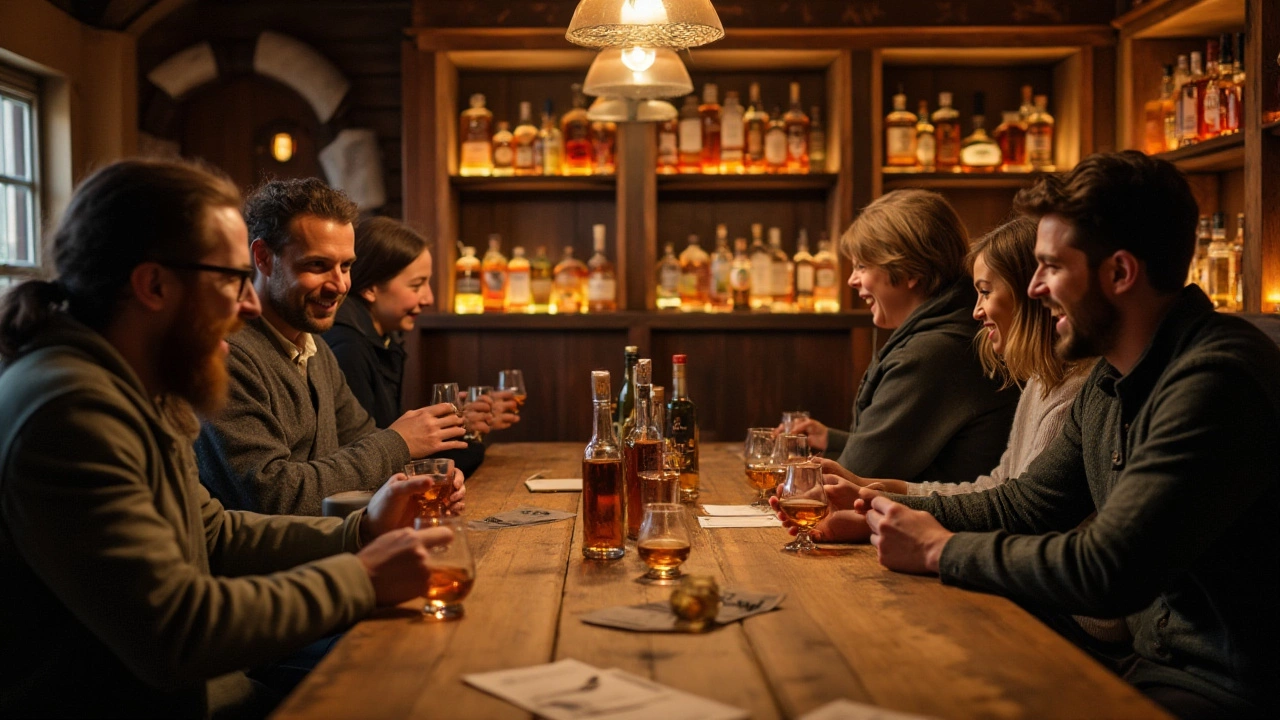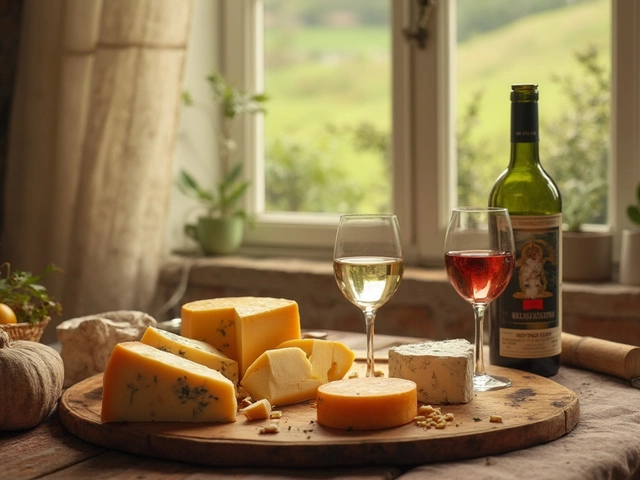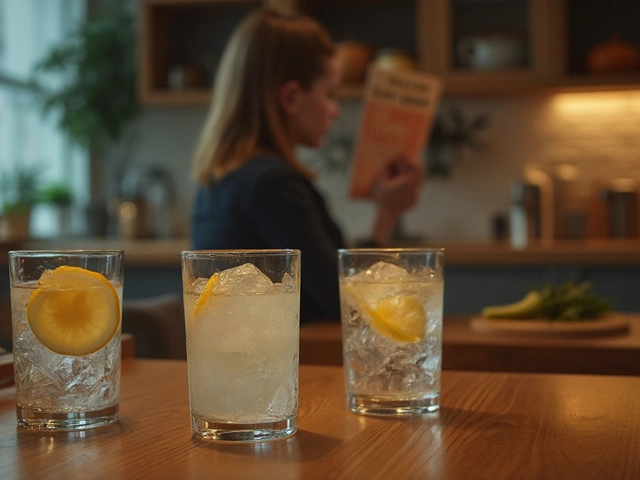Whisky tasting is more than just sipping and savoring; it’s an exploration of history, craftsmanship, and culture. Whether you're participating in a one-on-one tasting or part of a larger gathering, the time you invest can significantly influence your experience. Different events cater to various preferences - from brief, casual encounters to extended sessions designed for deeper dives into flavors and techniques. Knowing what to expect can turn a mere tasting into a memorable and enriching journey.
It’s also worth noting that the duration of a whisky tasting can vary greatly depending on several factors, such as the number of whiskies sampled or the level of detail your guide provides. Understanding these elements can help you prepare better and enhance your enjoyment. Dive into the wonderful world of whiskies with curiosity, and let the flavors tell their tales one taste at a time.
- Understanding the Nature of Whisky Tastings
- Factors Influencing the Duration
- Typical Timeframes for Different Tasting Events
- Enhancing Your Tasting Experience
- Tips for Planning Your Whisky Tasting Adventure
Understanding the Nature of Whisky Tastings
When stepping into the realm of whisky tasting, one is not simply indulging in a drink but embarking on a sensory journey that taps into history and craftsmanship. The roots of whisky date back centuries, evolving from humble beginnings into the complex spirit cherished today. Tasting whisky is about uncovering layers of flavors and aromas, each drop telling a story of its origin, the selection of grains, the distillation process, and the influence of aging. Every whisky has a personality, shaped by its unique production process and the artful blending of its components. The world of whisky is both vast and diverse, with a bottle on the shelf representing a link between the past's traditions and modern innovation. From peaty Scotch whiskies hailing from the Islay region to the smoother grains of Kentucky Bourbon, the variety is astounding and invites endless exploration.
A classic whisky tasting event typically begins with an introduction to the beverage's history and its significance in various cultures. This sets the stage for appreciating what comes next—an exploration of taste and aroma. Attendees are guided to use all their senses, learning to discern the subtle differences that make each whisky unique. Tasting techniques, like the gentle warming of the glass or the swirling that helps release the botanicals' essence, are explained, encouraging participants to engage fully with the spirit. A true whisky tasting is not a rushed experience; it is deliberate and methodical. Experts often recommend taking small sips to fully appreciate the nuanced flavors and long finishes that quality whiskies are known for.
According to renowned whisky connoisseur Michael Jackson, "Whisky is more than a drink; it's a way to travel the world from your armchair."
"It's like opening a book with each bottle, learning about the land, the climate, and the people who carefully craft these spirits."Such perspectives provide a richer context for tasters, giving meaning to the myriad of flavors experienced with each sip. The communal aspect of whisky tasting adds a layer of enjoyment, as shared experiences and discussions about flavor notes, preferences, and discoveries frequently lead to lively conversations and a deeper appreciation for the spirit.
Often, tasting sessions are accompanied by educational components, such as distillery history or insights into the science of distillation and aging. These are usually led by knowledgeable guides or master distillers eager to share secrets and intricacies of the craft. Participants might learn that a whisky's color can offer clues about its type and age, or hear about the significance of cask types in the flavor profile development. Whether it's a swift half-hour session sampling a couple of drams or an expansive evening designed to delve deep into a dozen variants, the time invested is as much about the story as it is about the taste.
Among the key elements influencing a tasting's pleasure is the atmosphere and setting. Often held in cozy, dimly lit environments reminiscent of classic whisky bars, these events are crafted to be intimate and immersive, drawing participants into a world seemingly separated from life's routine. Understanding whisky tasting is about embracing the environment, the storytelling, and the interactive learning experience it offers. It's an art that melds tradition with curiosity, creating experiences where people can come together to share a passion for discovering the many facets of this storied beverage.
Factors Influencing the Duration
When preparing for a whisky tasting, it's essential to recognize that time is a key variable, shaped by a handful of contributing factors. The most prominent factor that can influence how long a whisky tasting lasts is the type of event. Some tastings are informal gatherings, where guests taste one or two whiskies over a conversation that may take only half an hour. On the other hand, organized tasting sessions held by distilleries or specialized venues usually last longer. These structured events often dedicate time to educating attendees about the origins, production processes, and tasting notes of each whisky being sampled.
Another significant factor is the number of whiskies featured in the tasting. A basic tasting might include three or four varieties, which could easily run about an hour or so, giving participants enough time to appreciate each sip and note the differences. However, extensive tastings featuring ten or more samples could stretch into the realm of two hours or longer, especially if participants are encouraged to savor each whisky at leisure. As an enthusiast remarked during a tasting event,
"Savoring whisky asks more than just your taste buds; it demands your time for a nose-full of aromas and a length of palate."
The level of detail provided by guides or sommeliers also plays a crucial role in determining the duration. Some experts might delve deep into the history and technical nuances of each whisky, which naturally extends the session. This deeper exploration can enrich the experience, though it requires more time from participants. A knowledgeable host may transform a simple tasting into a journey through the ages, discussing the evolution of whisky-making techniques, regional distinctions, and even the impact of different types of tanks on flavor profiles.
Venue and Group Size
The setting of the tasting can also dictate the timeframe. A private, intimate tasting could progress more swiftly compared to a large group event where discussions and personal interactions are more frequent. Venues with a cozy atmosphere, such as rustic distilleries or speakeasy-style bars, may encourage leisurely sipping, whereas bright, bustling environments might see guests progressing more quickly through their samples.Interactive Components
Introducing interactive elements such as food pairings or blind tastings can both lengthen and enrich the experience. When food pairings are involved, participants are often prompted to observe how different foods alter or enhance the whisky's flavor profile, adding another layer to the tasting's duration. Similarly, blind tastings challenge participants to discern specific details without visual clues, thus encouraging more focused discussion and speculation that naturally take up more time.Ultimately, the length of a whisky tasting is a convergence of these factors. By considering them, participants can better calibrate their expectations and immerse themselves in the rich tapestries woven by the amber liquid they are about to embrace.
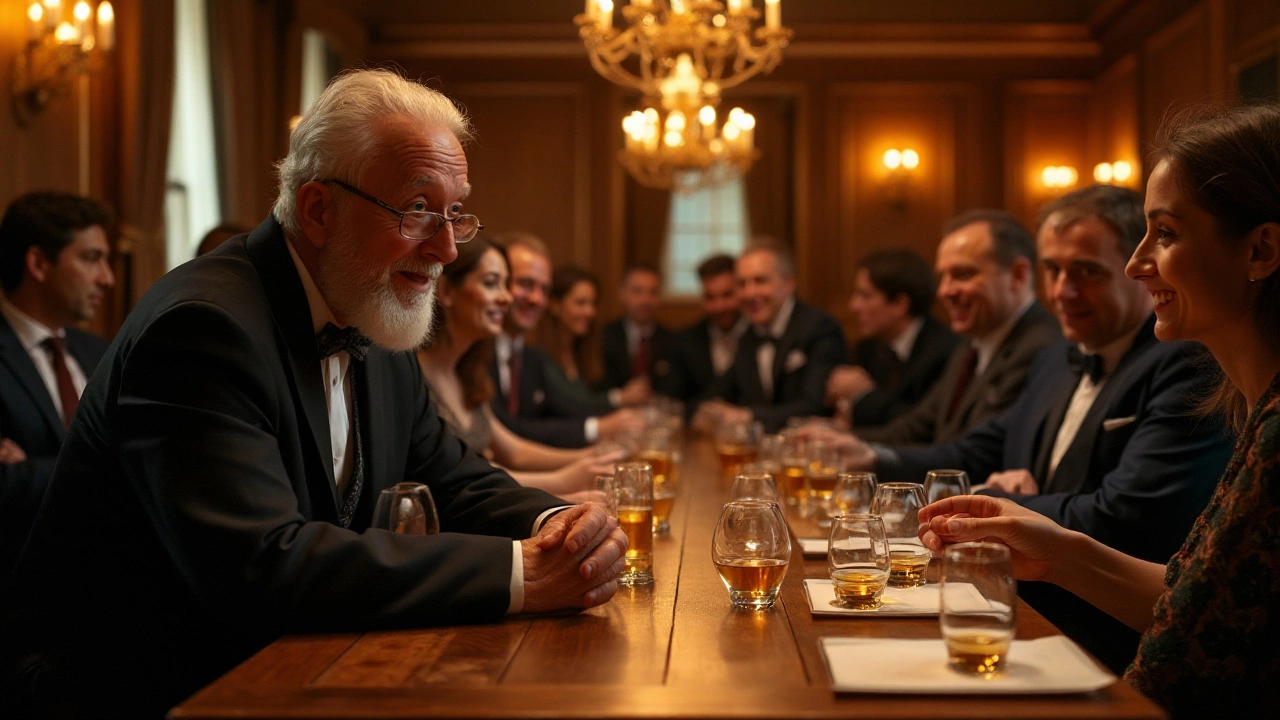
Typical Timeframes for Different Tasting Events
When it comes to whisky tasting events, the duration can be as varied as the whiskies themselves. Each tasting has its rhythm, guided by the depth of focus and the number of whiskies on offer. Generally, a basic tasting—ideal for beginners—might last around 45 minutes to an hour. This timeframe typically includes tasting up to three different whiskies, where participants are given ample time to savor each pour. These introductory tastings often accommodate those just getting acquainted with whisky nuances, ensuring that their first dip into this world is both pleasant and educational. A host may share some interesting anecdotes about the distilleries or offer a glimpse into the whisky-making process, all while encouraging attendees to note their impressions and preferences.
For those yearning to delve deeper, intermediate tastings often extend to about 90 minutes to two hours. Such sessions may present guests with a selection of five to seven whiskies. This expanded lineup allows for a more comprehensive exploration of different types of whiskies, from single malts to blended varieties. The additional time lets participants dissect each whisky’s character, comparing them against one another. This might involve a guided nose and taste experience, where the host elaborates on the subtle differences in aroma, texture, and flavor profiles. A quote from renowned whisky connoisseur Michael Jackson might capture the essence of such events:
"The joy of whisky is in the exploration and discovery of its many layers."
Advanced tastings cater mainly to seasoned enthusiasts and can last anywhere from two to three hours or longer. At this level, the events may incorporate specialized themes, such as rare whiskies or those from a specific region like Islay or Speyside. These tastings often include eight or more whiskies, encouraging an intense and scholarly pursuit of flavor. Participants might encounter limited edition bottles, each telling its own rich, historical story. This format may also incorporate pairings with fine cheeses or chocolates, enhancing the tasting experience. Such sessions might conclude with a Q&A with a master distiller or a seasoned expert, providing invaluable insights into the craft of whisky-making.
Of course, themed whisky dinners and larger events, like festivals, can stretch for hours and often combine tasting with dining, workshops, or even entertainment. These immersive experiences allow aficionados to indulge not just in whisky, but in the culture and community that surround it. A look at the yearly whisky gatherings might reveal a staggering array of styles and origins, where attendees lose themselves in tasting everything from peaty to sweet, and citrusy to spicy. Such elaborate events could attract both novices and connoisseurs, offering something unique and educative for each level of appreciation.
In essence, there's a whisky tasting event tailored for every palate and passion, with timeframes ranging to suit each preference. So whether you're sampling a flight over lunch or spending an evening amidst whisky aficionados, knowing what to expect can help you make the most of these delightful encounters.
Enhancing Your Tasting Experience
A great whisky tasting experience is about immersing yourself in the unique world of flavors and stories each bottle brings. While sipping is central, the magic often lies in the details surrounding that elegant swirl in your glass. To truly savor what whisky offers, nurture your senses and expand your understanding before and during the tasting session.
First, consider the ambiance. The setting can greatly impact your perception and enjoyment of whisky tasting. Ensuring the room is well-lit but not too bright, comfortable, and free from distracting scents helps you focus on the whisky's aroma. Background noise should be kept to a minimum, allowing the gentle clinking of glasses and the pour of whisky to be the primary sounds. Adjusting the environment to engage your senses can also make a huge difference. A cozy fire, soft music, or even just the right company can add layers to your tasting experience, transforming it from a simple event into a treasured memory.
When it comes to preparation, educate yourself about the whiskies you’ll be tasting. Knowing the origin story, production process, and flavor notes can deepen your appreciation. This knowledge not only primes your taste buds but also heightens your anticipation. Exploring the rich history and diverse styles of whisky can be an enlightening prelude to your session. After all, whisky is a tapestry woven with tradition and expertise that dates back centuries. Going into a tasting with some background can make even a novice feel like they're part of the narrative.
Incorporating food pairings is another way to elevate the experience. Choosing the right snacks can complement or even enhance the flavors of each whisky. Think of options such as dark chocolate for smokier whiskies or sharp cheeses for lighter, fruity ones. Pairings can accentuate certain flavors, offering entirely new taste dimensions. To dive deeper into this aspect, talk with your host or a knowledgeable sommelier; they often have creative suggestions that can surprise your palate. Some venues might offer pre-arranged pairings, while others rely on the whimsy and curiosity of the participants.
"The interaction between food and whisky is a dance of flavors; each sip and bite brings new nuances," notes whisky expert Michael Jackson.
Don't shy away from engaging in conversations. Sharing your thoughts with fellow enthusiasts can lead to valuable insights and new friendships. Attend group tastings if possible; these events often host a diverse crowd where you can learn from varied perspectives. When questions arise, don’t hesitate to ask. Whisky experts relish the opportunity to share their passion and knowledge. Remember, everyone from beginners to aficionados was once sitting exactly where you are now, exploring their first tastes and learning the vocabulary necessary to articulate what they’re experiencing.
Finally, be patient and allow ample time for the tasting. Rushing ruins the story each whisky tells. Take a moment to admire the color, inhale the aroma, and only then proceed to taste. These moments of pause are often where you capture the essence of the spirit, uncovering its hidden depths. Appreciate each element and you’ll come away from the experience feeling enriched and satisfied. So, whether your event is brief or spans several hours, treating each step as a cherished part of the journey ensures you won't miss out on any of the magic that a well-crafted whisky tasting can offer.
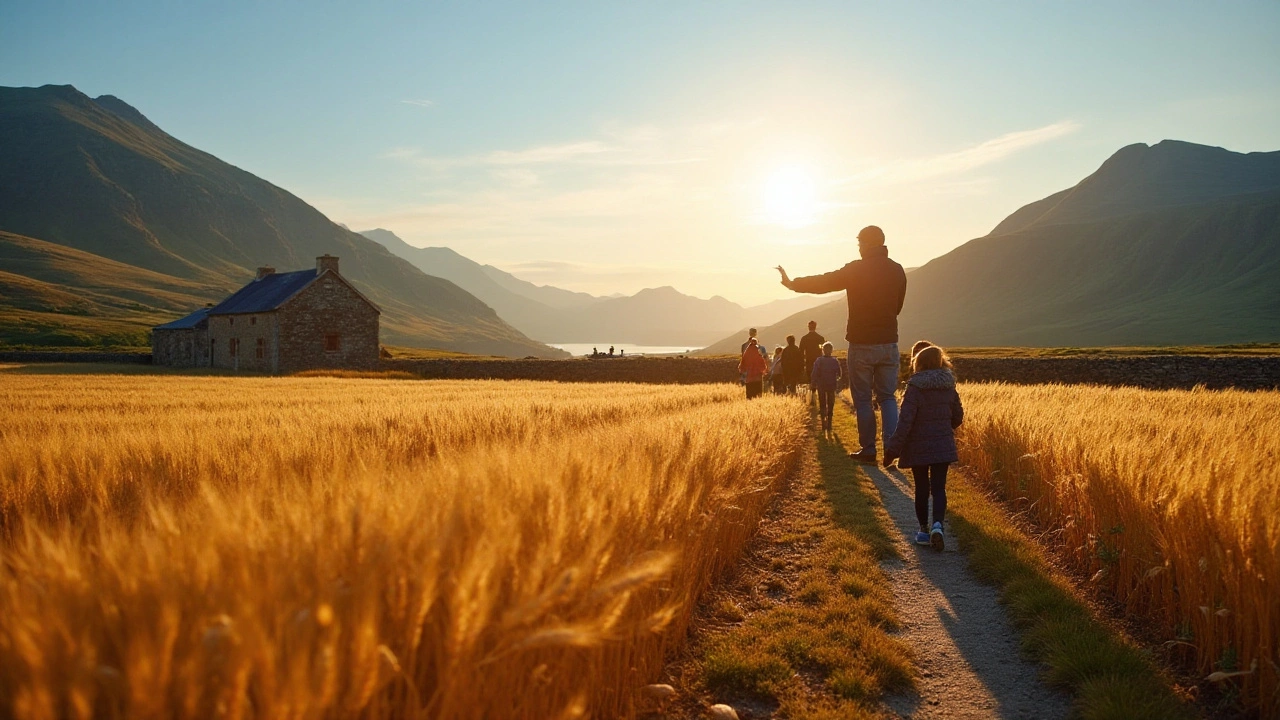
Tips for Planning Your Whisky Tasting Adventure
Planning a whisky tasting adventure can be as thrilling as the tasting itself. To create an unforgettable experience, it's important to consider several key aspects. Start with identifying the type of whisky tasting event that resonates with your preferences. Are you drawn towards a guided communal event where you share insights with fellow enthusiasts, or do you prefer an intimate setting tailored to your tastes? This choice will influence not just your timeframe, but the depth of knowledge you gain. Getting in touch with seasoned hosts or local whisky clubs often gives you access to exclusive events filled with rare and remarkable selections.
Timing is another crucial element. Depending on whether the event is a swift round of three tasting samples or an all-day affair featuring workshops and tasting menus, your schedule will need to accommodate. Some tastings emphasize not just variety but education, where a knowledgeable guide walks you through the process from distillation to tasting notes. Making room in your plans for such events ensures you absorb every facet of this rich tradition. Also, be prepared to delve into the nuances of whisky. Every bottle tells a story—from the grains chosen to the aging process, to the final blend. A calendar or planner can help keep your schedule and notes organized, turning insights into memories.
Location plays a significant role in the experience. While the countryside of Scotland or the desolate beauty of an Irish distillery tour may be on your bucket list, local tastings can also offer unexpected delights. Discover hidden gems in urban settings where innovative distillers craft unexpected twists on classic traditions. Strongly consider the venue's atmosphere; a rustic barn offers different acoustics and energy compared to a sleek city bar. Each brings unique charm to your tasting journey. Crowds can differ in number and character, so think about whether you prefer private tastings for personal attention or larger groups for diverse perspectives.
Let’s not forget the most integral part of any whisky tasting – the whiskies themselves. Craft a lineup that balances your curiosity with familiar favorites. You might opt for a themed tasting, like exploring different regions or specific types like single malts or blends. Many experts recommend starting with lighter whiskies and progressing to heavier, more complex flavors. Do remember to take notes during the session. Picking up on specific aromas and flavors can sometimes be challenging in the moment, but pen and paper (or digital notes) are invaluable tools for reflection. Bring a notebook to jot down thoughts, favorite picks, and interesting stories behind each pour.
Quenching thirst for knowledge enhances your enjoyment of the spirit. Read up on some of the key processes in whisky production — how the choice of grain affects flavor or the impact of different types of barrels and aging techniques. Many a connoisseur finds themselves fascinated by the science and art behind their glass. This pre-tasting education adds depth to your experience. Engaging with the process and enjoying it responsibly ensures a tasting isn't just about consumption, but genuine appreciation. Whether it's a new distillery's experimental batch or an age-old classic, every whisky offers an opportunity for discovery and connection.
